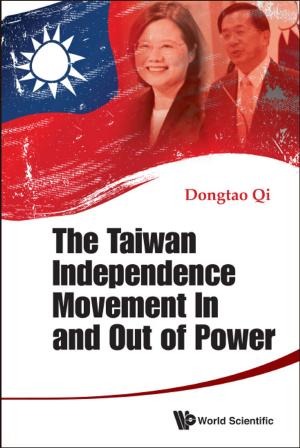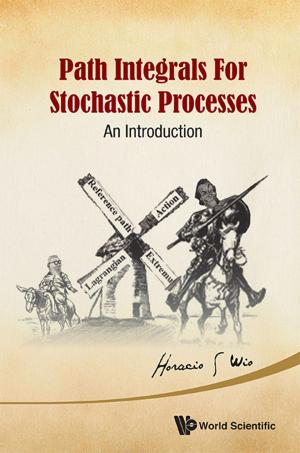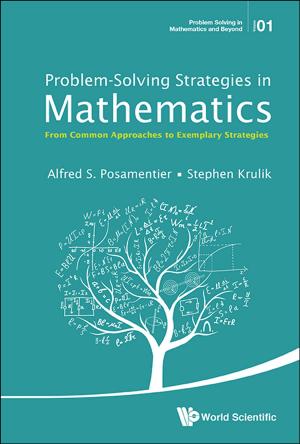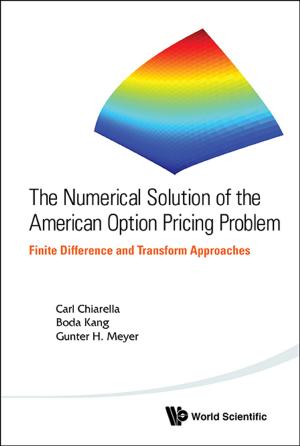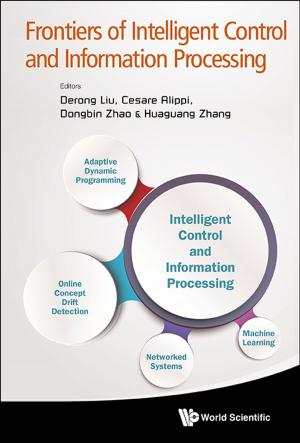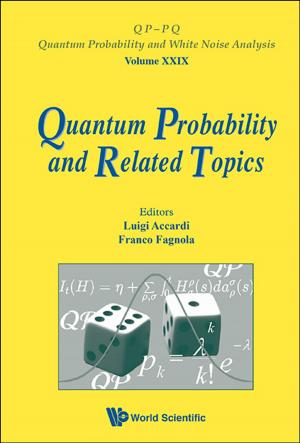Developing 21st Century Competencies in the Mathematics Classroom
Yearbook 2016, Association of Mathematics Educators
Nonfiction, Science & Nature, Mathematics, Study & Teaching, Reference & Language, Education & Teaching, Teaching, Teaching Methods| Author: | Pee Choon Toh, Berinderjeet Kaur | ISBN: | 9789813143630 |
| Publisher: | World Scientific Publishing Company | Publication: | May 20, 2016 |
| Imprint: | WSPC | Language: | English |
| Author: | Pee Choon Toh, Berinderjeet Kaur |
| ISBN: | 9789813143630 |
| Publisher: | World Scientific Publishing Company |
| Publication: | May 20, 2016 |
| Imprint: | WSPC |
| Language: | English |
The aim of this book is to contribute towards literature in the field of mathematics education, specifically the development of 21st century competencies amongst learners of mathematics.
The book comprising fourteen chapters, written by renowned researchers in mathematics education, provides readers with approaches and applicable classroom strategies to foster skills and dispositions that will enable learners to thrive in the fast-changing and complex world that we live in today.
The chapters in the book can be classified into three broad themes. The first is an examination of what is meant by 21st century competencies and how they can be developed within the context of the mathematics curriculum. The second is an in-depth discussion of evidence-based practices aimed at fostering specific competencies like metacognition and reflective thinking, critical thinking and communication skills. The last and third theme is about teaching approaches that are likely to feature increasingly in the 21st century classroom, for example flipped learning or the use of comics and storytelling.
Contents:
- 21st Century Competencies in Mathematics Classrooms (Pee Choon TOH & Berinderjeet KAUR)
- Mathematics Education, Virtues and 21st Century Competencies (Stephen THORNTON)
- Enriching Secondary Mathematics Education with 21st Century Competencies (WONG Khoon Yoong)
- Mathematics in 21st Century Life (Barry KISSANE)
- Mathematics Subject Mastery — A Must for Developing 21st Century Skills (Berinderjeet KAUR, WONG Lai Fong & Divya BHARDWAJ)
- Teaching in the 21st Century Mathematics Classroom: Metacognitive Questioning (Cynthia SETO)
- Listening and Responding to Children's Reflective Thinking: Two Case Studies on the Use of the National Assessment in Japan (Keiko HINO)
- Using Open-Ended Tasks to Foster 21st Century Learners at the Primary Level (YEO Kai Kow Joseph)
- Productive Talk in the Primary Mathematics Classroom (KOAY Phong Lee)
- Justification in Singapore Secondary Mathematics (CHUA Boon Liang)
- Examples in the Teaching of Mathematics: Teachers' Perceptions (Lay Keow NG & Jaguthsing DINDYAL)
- On the Efficacy of Flipped Classroom: Motivation and Cognitive Load (Weng Kin HO & Puay San CHAN)
- Use of Comics and Storytelling in Teaching Mathematics (TOH Tin Lam, CHENG Lu Pien, JIANG Heng & LIM Kam Ming)
- Game Theory: An Alternative Mathematical Experience (Ein-Ya GURA)
Readership: Graduate students, researchers, practitioners and teachers in mathematics.
Key Features:
- Firstly it has a focused theme: Developing 21st Century Competencies in the Mathematics Classroom, which is of prime concern to mathematics educators
- Secondly it is written by university scholars who work closely with classroom mathematics teachers thereby drawing on their research knowledge and classroom experiences
- Lastly, the book is a rich resource of tried and tested practical know-how approaches that promote mathematics learning, for mathematics educators in Singapore schools and elsewhere
The aim of this book is to contribute towards literature in the field of mathematics education, specifically the development of 21st century competencies amongst learners of mathematics.
The book comprising fourteen chapters, written by renowned researchers in mathematics education, provides readers with approaches and applicable classroom strategies to foster skills and dispositions that will enable learners to thrive in the fast-changing and complex world that we live in today.
The chapters in the book can be classified into three broad themes. The first is an examination of what is meant by 21st century competencies and how they can be developed within the context of the mathematics curriculum. The second is an in-depth discussion of evidence-based practices aimed at fostering specific competencies like metacognition and reflective thinking, critical thinking and communication skills. The last and third theme is about teaching approaches that are likely to feature increasingly in the 21st century classroom, for example flipped learning or the use of comics and storytelling.
Contents:
- 21st Century Competencies in Mathematics Classrooms (Pee Choon TOH & Berinderjeet KAUR)
- Mathematics Education, Virtues and 21st Century Competencies (Stephen THORNTON)
- Enriching Secondary Mathematics Education with 21st Century Competencies (WONG Khoon Yoong)
- Mathematics in 21st Century Life (Barry KISSANE)
- Mathematics Subject Mastery — A Must for Developing 21st Century Skills (Berinderjeet KAUR, WONG Lai Fong & Divya BHARDWAJ)
- Teaching in the 21st Century Mathematics Classroom: Metacognitive Questioning (Cynthia SETO)
- Listening and Responding to Children's Reflective Thinking: Two Case Studies on the Use of the National Assessment in Japan (Keiko HINO)
- Using Open-Ended Tasks to Foster 21st Century Learners at the Primary Level (YEO Kai Kow Joseph)
- Productive Talk in the Primary Mathematics Classroom (KOAY Phong Lee)
- Justification in Singapore Secondary Mathematics (CHUA Boon Liang)
- Examples in the Teaching of Mathematics: Teachers' Perceptions (Lay Keow NG & Jaguthsing DINDYAL)
- On the Efficacy of Flipped Classroom: Motivation and Cognitive Load (Weng Kin HO & Puay San CHAN)
- Use of Comics and Storytelling in Teaching Mathematics (TOH Tin Lam, CHENG Lu Pien, JIANG Heng & LIM Kam Ming)
- Game Theory: An Alternative Mathematical Experience (Ein-Ya GURA)
Readership: Graduate students, researchers, practitioners and teachers in mathematics.
Key Features:
- Firstly it has a focused theme: Developing 21st Century Competencies in the Mathematics Classroom, which is of prime concern to mathematics educators
- Secondly it is written by university scholars who work closely with classroom mathematics teachers thereby drawing on their research knowledge and classroom experiences
- Lastly, the book is a rich resource of tried and tested practical know-how approaches that promote mathematics learning, for mathematics educators in Singapore schools and elsewhere





